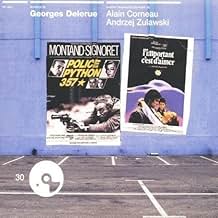Servais, photographe, rencontre Nadine, une actrice qui pour survivre, est contrainte de tourner des films porno. Il commandite une pièce de théâtre à l'insu de Nadine, où elle aura un rôle ... Tout lireServais, photographe, rencontre Nadine, une actrice qui pour survivre, est contrainte de tourner des films porno. Il commandite une pièce de théâtre à l'insu de Nadine, où elle aura un rôle qui lui permettra d'exprimer ses qualités.Servais, photographe, rencontre Nadine, une actrice qui pour survivre, est contrainte de tourner des films porno. Il commandite une pièce de théâtre à l'insu de Nadine, où elle aura un rôle qui lui permettra d'exprimer ses qualités.
- Récompenses
- 2 victoires et 3 nominations au total
- Le père de Jacques
- (scènes coupées)
- La mère de Jacques
- (scènes coupées)
- (as Andree Tainsy)
- Le médecin à l'hôpital
- (as Robert Dadies)
- …
Histoire
Le saviez-vous
- AnecdotesRomy Schneider considered this movie her best work.
- Citations
Jacques Chevalier: J'ai rêvé de toi. Tu me versais du Coca-Cola dans l'oreille... Une vilaine mort, croyez-moi !
- Versions alternativesItalian video version excludes some violent and explicit erotic scenes and runs 105 min.
- ConnexionsFeatured in La mano negra (1980)
Crammed in the high-ceiling, antique-looking Parisian apartments and loci like theatre, bar and hospital, its mise-en-scène strains to stay claustrophobic, fluid and quivering, signals the characters' shaky states, but, Zulawski and the screenwriter Christopher Frank fail to let their emotions run the full gamut to reach out its dazzled viewers, a stately but shallowly anaemic Testi cannot portray a role, whose inner depth is apparently out of his league, fumbles and routinely daydreams from scene to scene, his fervent gaze can not justify Servais' actions, his thoughts, and the limp dialogue doesn't help either.
Ms. Schneider, won Best Actress in the first-ever César Awards, is palpably more tapped into her role, sending off her raw charisma into her inwardly paralysed psyche, she tries to be frank with her own feelings, desire, dignity and pride at her own peril, but there are too many smoke and mirrors around to indulgently mystify an uncompounded, and fragmented story-line, the only thing to ameliorate the faint exasperation is when the pure dramatic sequences take the stage: Kinski's spit-fire flare-up is a mood-enforcer, Dutronc stands out in his chummy whims and delightfully erratic behavioural conundrum, a peculiar man who withdraws into a reprieve from, in an obvious tenor, a husband's functionality (abruptly falls into slumber so that his wife can only hopelessly play with herself to slake her desire), but also hatches up something seemingly unspeakable and inexplicable with Servais through an undertone of self-abandonment and total capitulation, in a muscle-versus-quirk contest over the same woman.
Zulawski's highbrow ambition to extract something refine and sophisticated out of the triangular deadlock doesn't consummately do the trick, in the end, Servais has to pay his debt with his blood and internal bleeding, from a father figure Mazelli (Dauphin), in his case, love IS the most important thing, if he can endure all the pain both physically and mentally, to demonstrate his unconditional devotion.
Georges Delerue's score is ever so conspicuous whenever a close-up is zoomed in between Servais and Nadine, to cloyingly illustrate their passion, otherwise, it remains forbidding and sinister, circles around a pessimistic account of love, in its purest but strangely tepid manifestation.
- lasttimeisaw
- 2 juil. 2016
- Permalien
Meilleurs choix
- How long is That Most Important Thing: Love?Alimenté par Alexa
Détails
Box-office
- Montant brut aux États-Unis et au Canada
- 19 120 $US
- Week-end de sortie aux États-Unis et au Canada
- 5 370 $US
- 16 juil. 2017
- Montant brut mondial
- 19 120 $US
- Durée1 heure 49 minutes
- Mixage
- Rapport de forme
- 1.85 : 1
Contribuer à cette page























